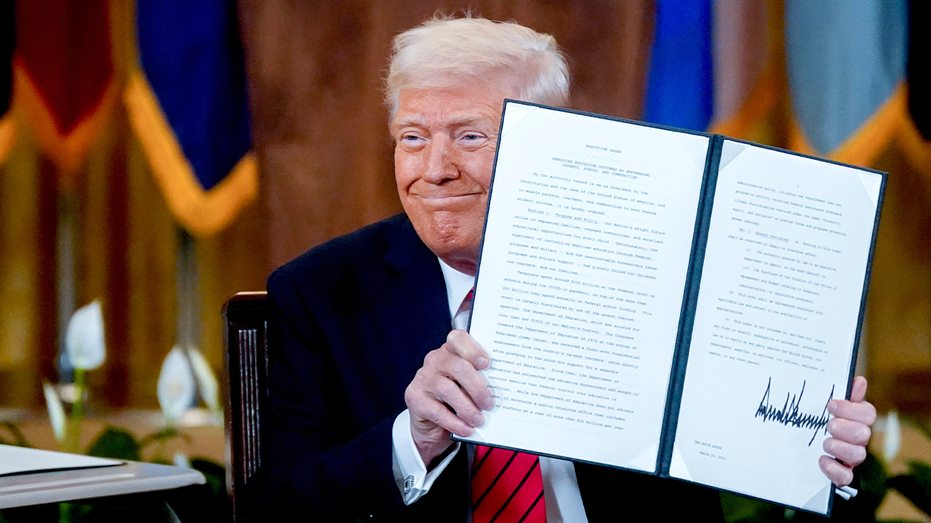The arrest of an executive at The Epoch Times in a money-laundering scheme this week has drawn attention to a media outlet that has lived largely in the shadows since its founding in 2000 and a transformation during the Trump administration.
Federal prosecutors in New York charged Weidong "Bill" Guan of Secaucus, N.J., chief financial officer of The Epoch Times, of steering at least $67 million in criminal proceeds, much from fraudulently obtained unemployment insurance benefits, to the company, its affiliates and himself. Guan pleaded not guilty but was suspended by The Epoch Times, which agreed to cooperate with prosecutors.
NPR CEO SLAMS EDITOR WHO EXPOSED BIAS. LOOKS LIKE TRUTH IS 'PROFOUNDLY DISRESPECTFUL'
The case calls into question the future of a company that was a key online supporter of Trump and spreader of conspiracy theories.
WHAT IS THE EPOCH TIMES?
Started first as a newspaper, the company produces news websites and videos, and is now available in 23 languages. Its founder, John Tang, is a Chinese-American who practices Falun Gong, a form of meditation and exercise. The Chinese government has denounced, banned and, according to members, has consistently oppressed and mistreated Falun Gong followers.
While the outlet has sought to distance its operations from the Falun Gong movement itself, the company has said it "sees the Chinese Communist Party's persecution of Falun Gong practitioners, and the remarkably heroic ways in which practitioners have responded to the persecution, as one of the most underreported stories of the last 20 years."
It is by no means a one-issue news organization, and the lead story on its website Wednesday was about U.S. political primaries the night before. But The Epoch Times does frequent and tough reporting on the Chinese government; stories on its website Wednesday included an opinion piece on the origins of the COVID virus and a look back at the Tiananmen Square massacre on its 35th anniversary. The site also prominently touts a book by Falun Gong founder Li Hongzhi.
The Epoch Times says that "our aim is not to force our perspective on you, but to give you the information you need to make up your own mind."
HOW DID THE EPOCH TIMES CHANGE?
The Epoch Times website currently has testimonials from Trump administration figures Peter Navarro and Sebastian Gorka and U.S. Rep. Paul Gosar, a Republican from Arizona.
That's a clue. The news organization transformed itself during the Trump years by becoming a site that the supported the former president and his causes. It was opportunistic in two ways: leaders saw in Trump a president they believed would fight against the Chinese government, and sensed the chance to win funding from others who believe in the cause, said A.J. Bauer, a University of Alabama professor who studies conservative media.
In a few years' time, the outlet became a partisan powerhouse and "has also created a global-scale misinformation machine that has repeatedly pushed fringe narratives into the mainstream," The New York Times reported in 2020.
It embraced various conspiracy theories, many surrounding COVID. The Epoch Times and affiliates advanced the false story that the Obama administration spied on Trump's 2016 campaign and spread theories promoted by the QAnon conspiracy site and claims about voter fraud.
The Epoch Times was particularly aggressive on Facebook through advertising and the creation of different pages that guided social media users to their content. Following an investigation by NBC News, the social media giant in 2019 banned pro-Trump advertisements produced by the outlet for violating its ad policies.
The indictment doesn't specifically say that these pro-Trump efforts were funded through the alleged criminal scheme. But it was around this time that money was pouring in. The Epoch Times reported nearly $128 million in revenue for 2021, a stunning increase from $4 million in 2016, according to a federal financial disclosure. The turnaround caught the eye of banks, regulators and, eventually, federal prosecutors.
Much of the money came in through the company's "Make Money Online" team, run by Guan, according to the federal indictment. Guan has claimed the windfall was due in part to an increase in subscriptions and donations, the indictment said.
WHAT DOES THIS MEAN FOR THE EPOCH TIMES' FUTURE?
Guan is the only one charged by prosecutors. But the indictment states that "others known and unknown" were aware of what was going on, raising questions about whether anyone else at the company might be drawn in and what this might mean for The Epoch Times' future. The company didn't immediately respond to a query on the topic.
Given the action taken against the company by Facebook in 2019, it's questionable whether the playbook used before has relevance for the 2024 campaign. Some avenues for reaching people have undoubtedly closed because the social media site has been deemphasizing news and political content, Bauer said.
Conservative figures certainly noticed the work put in by The Epoch Times on behalf of their causes. Despite that, the outlet has had surprisingly little influence, said Howard Polskin, who monitors conservative media for The Righting website.
"They don't seem to be driving the news agenda in right wing media," Polskin said. "I don't think right-wing media is paying much attention to what they are doing."
Bauer agreed. The Epoch Times' influence seems largely confined to people for whom opposing the Chinese government is a main cause, he said.
"They're having a hard time, just like everybody else in the media, in finding an audience at this moment," Bauer said. "I don't think there's too many people calling up The Epoch Times on their computer with their morning coffee to see what they have to say."

 German (DE)
German (DE)  English (US)
English (US)  Spanish (ES)
Spanish (ES)  French (FR)
French (FR)  Italian (IT)
Italian (IT)  Macedonian (MK)
Macedonian (MK)  1 year ago
43
1 year ago
43








Comments